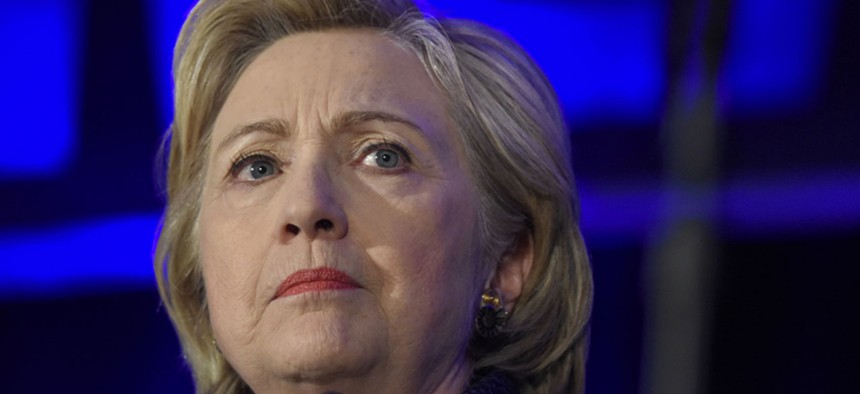
a katz / Shutterstock.com
Clinton’s Coronation Becomes a Grind
She and Sanders will battle through March, costing her money and precious staff time.
Bernie Sanders has already given Hillary Clinton a nasty scare in Iowa, and is likely to hand her a loss next week when New Hampshire voters cast their ballots.
If that were the only damage his insurgent, anticorporate campaign inflicts on the Democratic front-runner’s presumed path to the nomination, it probably would mean little to her chances to win the White House this November.
Unfortunately for Clinton, though, that’s not the only damage she can expect: The layout of the primary schedule, the proportional manner in which delegates are awarded, and Sanders’s surprising fundraising strength all mean that the former secretary of State will be forced to expend both money and, even more precious, staff time competing in places that almost certainly will not be in play this November.
Clinton campaign manager Robby Mook, in an MSNBC appearance, acknowledged a state-by-state grind that will go through March, when more than half of the total delegates up for grabs will be awarded. “We’re just going to keep plugging away and earning and re-earning those votes,” he said.
The campaign has already staged more than 10,000 debate-watch parties, phone banks, and organizing meetings in those 11 states, and points out the groundwork already under way in Colorado, which holds caucuses on March 1.
But while Colorado and Virginia will likely be key states in the general election—so spadework now will benefit Clinton this autumn—also on the ballot that day are contests in Alabama, Georgia, Oklahoma, Tennessee, and Texas, none of which has much possibility of voting Democratic this November.
The Clinton campaign is already explaining away a New Hampshire loss next week as a given, with Sanders representing neighboring Vermont in the Senate. After New Hampshire, the caucuses in Nevada three weeks from now look more favorable for Clinton, and at the end of the month she is poised to do very well in South Carolina, where African-American voters can make up a majority of the primary electorate. Clinton has deep roots in that community, while Sanders has so far struggled to connect with black voters.
Still, even if she wins South Carolina overwhelmingly, there is little reason for Sanders to leave the race, given the tens of millions of dollars he’s been able to raise, largely from the hordes of donors who have sent about $30 each. Sanders started adding staff late last year, when the money surge allowed him to dramatically increase his budget. Early last month, campaign manager Jeff Weaver announced Sanders had staff in all of the March 1 states.
Indeed, a National Journal analysis of his recent Federal Election Commission filing shows that 174 of the Sanders camp’s 640 staffers were in the 11 states that vote on March 1 (although that figure may be slightly overstated because Vermont, where Sanders has his headquarters, is among those states). That filing also shows that Sanders is making a serious push in South Carolina, where 126 staff received paychecks in the final three months of 2015.
Yet even that focus on South Carolina by both campaigns illustrates what the eventual candidate, whoever it is, must sacrifice. That state has not voted Democratic in a presidential election since 1976—which means the candidate time, the TV ads, and the canvassing effort in the coming weeks will count for almost nothing on Feb. 28, the day after the primary.
Sanders staffers had been making an average of $1,500 per month in the final quarter of 2015, based on the National Journal analysis, while the average Clinton staffer made about twice that. Which means hundreds of Democratic staff deployed in deeply red states for an extra month or two will cost millions in salary alone. And every day a campaign worker is in Oklahoma or Texas or Alabama is a day that person is not in Florida or Pennsylvania or other likely battleground states this November.
Clinton, in an interview with CNN last month, was nevertheless upbeat about the likelihood of a prolonged slog. “Remember, I campaigned all the way into June last time,” she said.
Mo Elleithee, a former Democratic strategist who now runs the Institute of Politics and Public Service at Georgetown University, said there is a silver lining to something like that happening again.
“It helps Democrats up and down the ticket. It helps the party as a whole,” he said.
Elleithee acknowledged that a drawn-out nomination fight presents a “resource management” problem for the candidates, but challenged the idea that time and effort spent in red states was necessarily wasted.
“In the media environment that we live in, what happens on the ground in Alabama is heard about in the battleground states,” he said, adding that a side benefit could be putting some Republican states in play—such as what happened in 2008 with Indiana and North Carolina, which Barack Obama won that November.
“These things can have the benefit of changing the map a little bit. Could Georgia suddenly become slightly more competitive?” he said. “It certainly adds to the calculus.”
(Image via a katz / Shutterstock.com)






